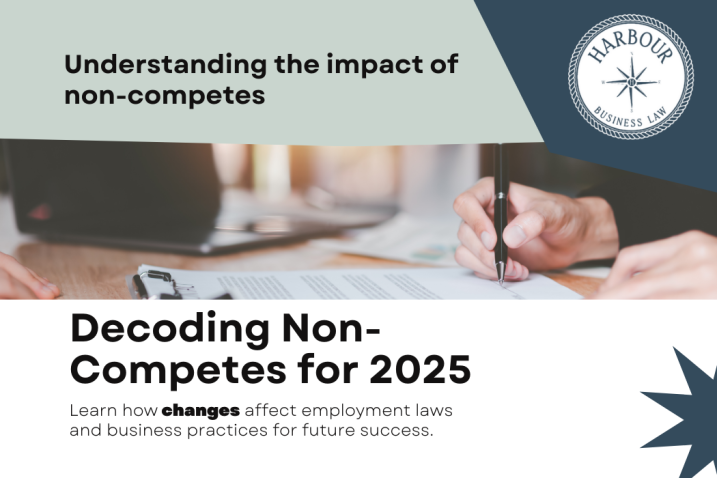
Non-compete agreements are a hot topic in business law. They aim to balance protecting employers’ legitimate business interests and respecting employees’ right to pursue their careers. This blog explores their enforceability and provides key insights for consideration.
Introduction to Non-Compete Agreements
Non-compete agreements, often called restrictive covenants, are contractual provisions that limit an employee’s ability to join a competitor or establish a competing business after departing from their current job. These agreements have played an essential role in safeguarding confidential information, client relationships, and other valuable business assets. However, their enforceability is subject to careful scrutiny by courts, which seek to balance the competing interests at play.
Balancing Employer and Employee Interests
A key point of tension in non-compete litigation revolves around balancing the employer’s need to protect their business with the employee’s right to earn a living and advance their career. Courts recognize the importance of fostering competition and preventing undue hardship on employees. Therefore, non-compete agreements must be carefully drafted to avoid being overly broad or restrictive.
Key Factors Affecting Enforceability
Several key factors influence the enforceability of non-compete agreements. These include:
Tailoring Agreements and Protecting Information
Non-compete agreements should be tailored to protect specific business interests to maximize the likelihood of enforceability. Focusing on information protection, such as trade secrets and confidential data, is often a strong basis for enforcement. Vague or overly broad restrictions are more likely to be struck down by courts.
Enforceability and Key Individuals
While the enforceability of non-competes can vary based on several factors, they often remain enforceable for high-level executives or co-founders/owners unless agreed upon otherwise, those with access to trade secrets, and individuals in positions of trust who have developed significant relationships with clients or customers.
Exceptions to the Rule
While the rule broadly seeks to limit non-compete agreements, two key categories remain unaffected:
1. Existing Non-Competes with Senior Executives: The rule permits existing non-competes with senior executives to remain valid but prohibits new agreements in this category.
2. Non-Competes in “Sale of Business” Agreements: A narrow exception exists for non-competes included in legitimate “sale-of-business” agreements, such as the sale of a business or its substantial assets.
Recent Legal Developments and Careful Drafting
The legal landscape surrounding non-compete agreements is constantly evolving. Recent developments, including proposed federal legislation and state-level reforms, highlight the importance of staying informed and adapting agreements accordingly. Careful drafting is essential to ensure compliance with current laws and maximize the chances of enforceability.
A court order issued on August 20, 2024, has blocked the Federal Trade Commission (FTC) from enforcing its rule on non-compete agreements. The FTC has appealed this decision, filing its case with the U.S. Court of Appeals for the Fifth Circuit on October 18, 2024.
The FTC cannot enforce the non-compete rule nationwide at this time. As a result, the rule, initially set to take effect on September 4, 2024, remains on hold.
However, that doesn’t mean you shouldn’t plan for what may come in 2025. Have your contracts reviewed by your business attorney to see how you can continue to protect your business while aligning wording clauses should non-competes become invalid.
Conclusion and Key Takeaways
Non-compete agreements are helpful for protecting business interests, but their enforceability depends on a thoughtful analysis of various factors. Employers should focus on tailoring these agreements to meet specific objectives, like protecting confidential information, while ensuring compliance with applicable state laws. At the same time, employees should be informed of their right to seek legal counsel if they have any concerns about a non-compete agreement. Consulting with a qualified business attorney for both parties is strongly recommended to navigate the complexities of non-compete agreements, adapt to evolving regulations, and safeguard the interests of all parties involved.
And most importantly, stay informed as developments unfold in this ongoing legal battle, which could significantly impact businesses and employees alike as rules continue to be modified.
_____________________________________________________
Don’t have a business attorney? Get in touch with our team by emailing Info@harbourbusinesslaw.com.
_____________________________________________________
This Blog was written by Founding Attorney, Katelyn Dougherty.
DISCLAIMER: This blog is for educational purposes only and does not offer nor substitute legal advice. This blog does not establish an attorney-client relationship and is not for advertising or solicitation purposes. Any of the content contained herein shall not be used to make any decision without first consulting an attorney. The hiring of an attorney is an important decision not to be based on advertisements or blogs. Harbour Business Law expressly disclaims any and all liability in regard to any actions, or lack thereof, based on any contents of this blog.